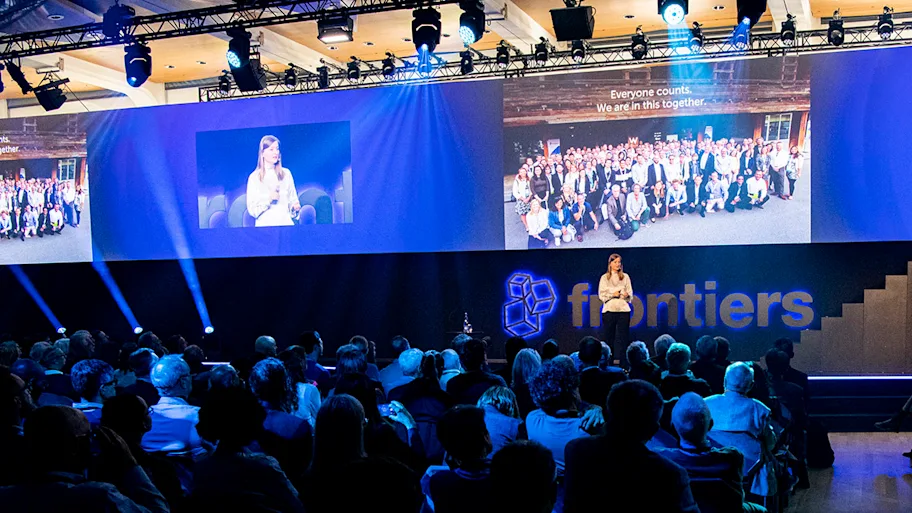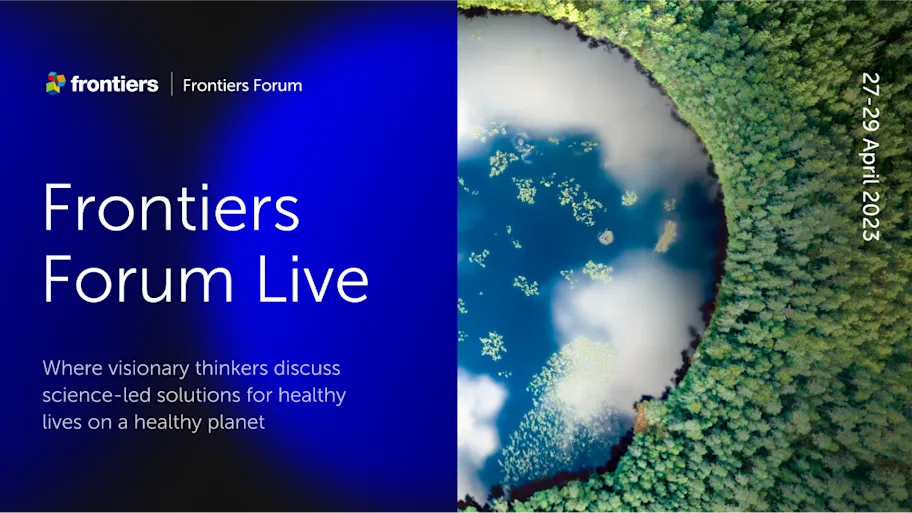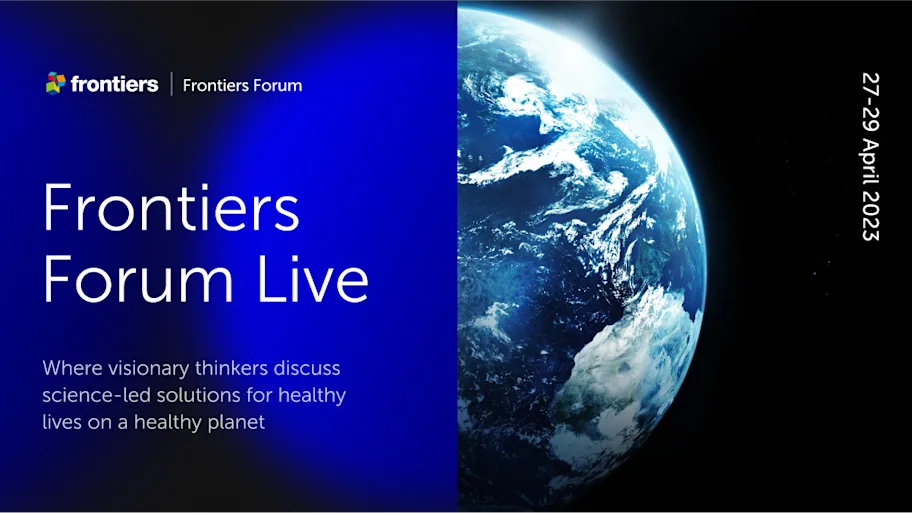
- Science news
- Top news
- Frontiers Forum Live 2023: Accelerating and mobilizing open science for global challenges
Frontiers Forum Live 2023: Accelerating and mobilizing open science for global challenges
This year's Frontiers Forum Live brought top researchers, innovators, and influencers together in-person and virtually, united in a common mission to accelerate the global transition to open science and mobilize solutions for critical challenges – with the most urgent being to reach net-zero carbon to prevent climate disaster.
The Frontiers Forum is where researchers, policymakers, and other experts from around the world discuss science-led solutions for healthy lives on a healthy planet. This 8th edition was the largest yet, taking place in Montreux, Switzerland from 27-29 April as our first-ever hybrid event.
The program highlighted the accelerator effect of open science, making it clear that science has solutions to the climate crisis and other critical challenges – but must be openly available to researchers and innovators across the globe for these solutions to be implemented in time to avert disaster.
Keynote talks from Frontiers co-founder and CEO Dr Kamila Markram as well as four iconic representatives of biodiversity, sustainability, and climate change – conservationist Dr Jane Goodall, eighth Secretary-General of the United Nations Ban Ki-moon, former US Vice President Al Gore, and planetary boundary pioneer Prof Johan Rockström – reinforced the central role of science in restoring planetary health. And a new challenge was identified by historian and best-selling author Prof Yuval Noah Harari: the potential of AI to disrupt human civilization. » See keynote talks
Twenty outstanding scientists were recognized for their research to keep us safe within our planet’s boundaries in the inaugural Frontiers Planet Prize Awards Ceremony, which took place as part of Frontiers Forum Live. Four International Champions were also announced, sharing the prize of 3 million Swiss francs to support their continuing research into the vital effort of stabilizing our planet’s ecosystem. » Meet the International Champions
Talks from science leaders further showcased humanity’s ability to understand and conquer different health challenges by working collaboratively across all levels of society. » See science talks
Frontiers Forum Live attracted international media interest, with news articles and features published in more than 800 outlets across 43 countries, including The Independent, Time magazine, and The Times.
The three days also fostered dialogs and discussions across all areas of science and policy – facilitating multidisciplinary collaborations and partnerships that will help catalyze transformational change and build a brighter future.
Watch the keynotes and science talks via the links below.
Jump to:
Keynote speakers: Kamila Markram, Jane Goodall, Ban Ki-moon, Johan Rockström, Yuval Noah Harari
Science talks: accelerating science-led solutions for healthy lives on a healthy planet
Keynote speakers
Leaders in open science, biodiversity conservation, sustainable development goals, climate change, and AI addressed today’s critical challenges and progress to date – calling for open science and united action to keep our planet and societies safe.
Open science for healthy lives on a healthy planet

Frontiers co-founder and CEO Dr Kamila Markram described how science has improved human lives over the past 200 years and the consequences of this on the Earth's planetary boundaries – ending with an urgent message to accelerate the global transition to open science to solve the climate crisis before it's too late.
Reasons for hope

In her opening address to the Frontiers Planet Prize Awards Ceremony, Dr Jane Goodall, founder of the Jane Goodall Institute, outlined why she believes humanity’s indomitable spirit will overcome the climate crisis, and how the scientific community adds to her hope for the future.
Mission possible: accelerating sustainable development through open science and cooperation

Ban Ki-moon, eighth Secretary-General of the United Nations, spoke of the need for global solutions to address global crises such as armed conflict, pandemics, and climate change that are inherently intertwined and interconnected.
A safe landing within planetary boundaries: scientific advances for a sustainable future

Prof Johan Rockström, Director of the Potsdam Institute for Climate Impact Research, gave the scientific evidence for the critical need to stay to within 1.5°C of warming – and to keep our planet in the only state we know that can support humanity, the Holocene.
Future of the planet, future of humanity

Historian and best-selling author Prof Yuval Noah Harari from the Hebrew University of Jerusalem spoke on the potential for artificial intelligence to become our planet’s first inorganic lifeform – and the threat this 'alien' intelligence poses to human civilizations, even without becoming conscious or able to navigate the physical world.
Frontiers Planet Prize: meet the International Champions
Launched in 2022 by the Frontiers Research Foundation, the Frontiers Planet Prize aims to promote and recognize the scientists who will help Earth remain within the nine planetary boundaries described by Prof Johan Rockström in his keynote talk.
The first 20 National Champions, representing the winning nomination per country, were celebrated at the Frontiers Planet Prize Awards Ceremony held as part of Frontiers Forum Live. Four International Champions were also announced, sharing the prize of 3 million Swiss francs to support their continuing research into the vital effort of stabilizing our planet’s ecosystem. » Watch the awards ceremony highlights
Sustainable-use protected areas improve local community well-being

United Kingdom International Champion Prof Carlos Peres from the University of East Anglia outlined the first evidence that community-based conservation programs can improve the livelihoods of rural families living in Amazonian protected areas – a win-win for nature and people that can readily be scaled.
Efficacy of water catchment restoration in a changing climate

South Africa International Champion Prof Mark New from the University of Cape Town showed that restoring water catchments by removing alien invasive trees would have reduced water stress during a major drought in South Africa – filling a critical gap in real-world evidence on the efficacy of nature-based solutions like habitat restoration.
Double climate benefits from a Great Food Transition

Netherlands International Champion Dr Paul Behrens from Leiden University presented a groundbreaking analysis that for the first time quantifies the significant reduction in greenhouse gas emissions if high-income countries move away from eating meat and restore land spared from animal farming.
Ammonia: a cost-effective priority for cleaner air

China International Champion Prof Baojing Gu from Zhejiang University presented a game-changing map of how nitrogen emissions contribute to deadly air pollution, plus an analysis showing that ammonia is a better target than nitrogen oxides for tackling this global health threat.
Frontiers Planet Prize closing performance

Natasha Tsakos wrote, and with Enrique Villacreses performed, Opus 9 as the closing performance to the Frontiers Planet Prize Awards Ceremony. Natasha is Show Maker and Chief Imagination Officer of NTiD Inc.
Science talks: accelerating science-led solutions for healthy lives on a healthy planet
Renowned science leaders showcased the latest developments and thinking across a number of health and societal issues – further highlighting the crucial role of research and collaboration in ensuring healthy, long lives.
Genes and cells that influence the rate of aging

Vice President of Aging Research at Calico Life Sciences, Prof Cynthia Kenyon, outlined newly discovered treatments to extend health and lifespans in animals, and explained what we need to do to translate these findings to humans.
SARS-CoV-2: a permanent presence in our own DNA?

Prof Rudolf Jaenisch from the Massachusetts Institute of Technology presented evidence that SARS-CoV-2 RNA can retro-integrate into the human genome, postulating whether this could explain why some people experience long COVID.
Safeguarding exponential biology

Prof Kevin Esvelt from the Massachusetts Institute of Technology outlined our increasingly powerful ability to genetically edit and to reprogram entire species – and the defenses, checks, and balances that need to be in place to ensure community consent to ecological engineering plus mitigate any potential unintended consequences.
Keeping cool amid the climate crisis

Dr Britt Wray from Stanford University revealed a surprising truth: while climate change and ecological crises can push us into a state of eco-anxiety, numbness, and fatalism, this grief can also mobilize and spark action that both improves mental health and benefits the planet.
Vaccinating the world – lessons from Gavi and COVID-19

Dr Seth Berkley, Chief Executive Officer of Gavi, the Vaccine Alliance, explained the historic challenges to vaccinating people in low-income countries and how Gavi has successfully overcome these.
Achieving net zero – transitioning to a healthy Anthropocene is possible

In a panel discussion hosted by science writer and broadcaster Vivienne Parry, Prof Johan Rockström of the Potsdam Institute for Climate Impact Research, Prof Yuval Noah Harari of the Hebrew University of Jerusalem, and Prof Mary Scholes from the University of the Witwatersrand talked about the challenges of reaching net zero, what additional science is required to make the transition possible, effective communication strategies and policies to mobilize the stakeholders involved, and how equity can be achieved on a global scale.
List of all speakers
Keynote speakers
Kamila Markram | Open science for healthy lives on a healthy planet
Jane Goodall | Reasons for hope: Frontiers Planet Prize Awards Ceremony opening address
Ban Ki-moon | Mission possible: accelerating sustainable development through open science and cooperation
Johan Rockström | A safe landing within planetary boundaries – scientific advances for a scientific future
Yuval Noah Harari | Future of the planet, future of humanity
Frontiers Planet Prize: meet the International Champions
Carlos Peres | Sustainable-use protected areas improve local community well-being
Mark New | Efficacy of water catchment restoration in a changing climate
Paul Behrens | Double climate benefits from a Great Food Transition
Baojing Gu | Ammonia: a cost-effective priority for cleaner air
Natasha Tsakos and Enrique Villacreses | Opus 9 – Frontiers Planet Prize Awards Ceremony closing performance
Science talks: accelerating science-led solutions for healthy lives on a healthy planet
Cynthia Kenyon | Genes and cells that influence the rate of aging
Rudolf Jaenisch | SARS-CoV-2: a permanent presence in our own DNA?
Kevin Esvelt | Safeguarding exponential biology
Britt Wray | Keeping cool amid the climate crisis
Seth Berkley | Vaccinating the world – lessons from Gavi and COVID-19
Panel discussion with Johan Rockström, Yuval Noah Harari, and Mary Scholes | Achieving net zero – transitioning to a healthy Anthropocene is possible






